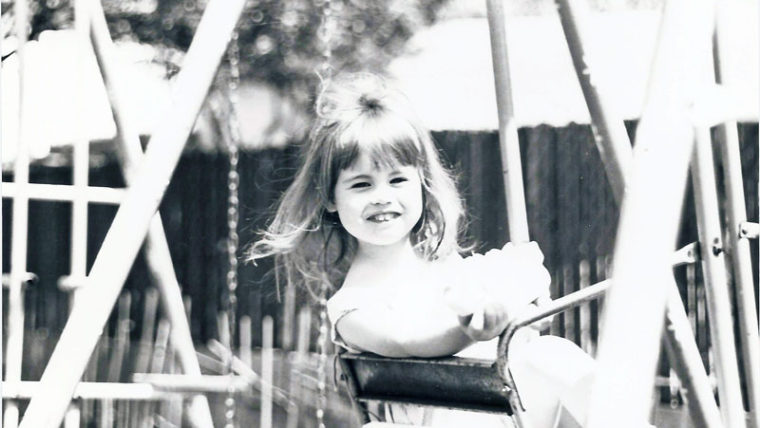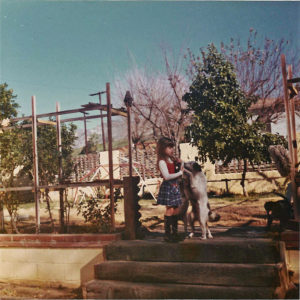
– by Dawn Pedersen, M.eD.
These are the outdoor recollections I hold dear from a childhood spent in Los Angeles. I hope that my preschool-age son Theo will have the same freedom I enjoyed then and there, in his own way. Each of these snapshots from my past–ages of about 6 to 12–still glitters in my memory, because it was a vital element of who I have become. These experiences were not unique; many of them were repeated year-after-year in variations. They form a foundation that supports my independence, self-assurance, and love of outdoors today.
I grew up in the San Fernando Valley in the 1970s. The quiet suburban neighborhood that was my world then has changed since, but not overly so. I lived in a little 2-bedroom house on the corner.
I had a best friend Lisa, who was my next-door neighbor from age 2 through elementary school. She and her other neighbor, Diane, and I used to play Charlies Angels. We fashioned guns from sticks or our hands. Sometimes we got lucky and had cap guns or water pistols. We played in the street, hid in bushes, ran everywhere. Lisa always got to be Farrah Fawcett because she was the blond.
We played baseball in the street. We rode with our bottoms on skateboards, down the hills in the two streets that joined in front of my house. We drew in white chalk on the asphalt, big pictures. We rode Big Wheels and similar toys on the sidewalks and streets. We roller skated with skates attached to our shoes, and later with actual roller skates in our size. We cartwheeled in the streets.
Lisa and I both had giant pine trees in our front yards. My tree was not very suitable for climbing, but Lisa’s was perfect. She showed me how to grab the lowest branch, hook a leg over it, and pull myself up. Then I had a steady climb to a cradle of branches at the top. From there, I could see the whole neighborhood, or so it seemed. It felt exhilarating.
Lisa and I memorized Hotel California by Eagles together, outside while my record player was engaged inside. I still have that song memorized, and I belt it out when it comes on the radio. I don’t remember very much from Beth by KISS (her favorite,) even though we made up a dance to go with it in her back yard. There may have been roller skates involved.
The nearest playground was at our very own school, so on weekends we would squeeze through a gap under the gate, or clamber over the fence, and play there. We flew kites there and skated there, and climbed the monkey bars and did our own little gymnastics. Of course, this playground was also our habitat during recess and lunch on schooldays too, a roomy asphalt nirvana. Often I was alone during recess so I’d smack a tether ball around, or ride an imaginary horse.
My parents outfitted our backyard with a jungle gym and swings. I climbed these structures as well as the orange trees and the fences into our neighbor’s yards. On at least one occasion, Lisa and I crawled up onto her detached garage which adjoined our yard. We scooped up handfuls of small white pebbles from the tar paper on its roof, and threw the rocks into my backyard. For no particular reason. I once landed on a nail while barefoot, entering the other neighbor’s backyard from over the wrought-iron fence. I couldn’t be blamed–they had an apricot tree loaded with ripe fruit. I played with our dogs and rabbits and chickens and ducks in the back yard. I made mud puddles with the hose and built mud cities.

My friends and I played in the sprinklers in the front yard when it was hot, and drank out of the hose. We ran for the ice cream truck and gave up our hard-earned quarters in exchange for cold treats. We’d sit on the red concrete curbs and try to finish off popsicles and drumsticks before the sugary melt dripped down to our elbows. Sometimes we were banned from coming inside until dinner, if it was nice outside. And recall that this was L.A. It was almost always nice outside.
Up one hill and across the street, I’d yank grass out from my side of the fence and offer it through the chain links to cows residing on the other side. Up the other hill and across the street, I’d wander through the vacant lot, inspecting discarded junk in the weeds. I’d climb the wooden rungs nailed into a tree trunk there, up to the platform someone had built years earlier.
We would hear our mothers calling our names from blocks away when it was time to come home. Sometimes we’d fake hearing our name on the wind, if we wanted to beg out of playing with those particular friends for some reason.
When I got older (maybe 9 or 10,) I was allowed to ride my bike several blocks away from the house. I’d take it for a cruise around all the cul-de-sacs, through alleyways, into new places. I’d take it to friend’s houses, or to a store that had a nice candy selection. I once found some kind of construction site and found it spooky but irresistible for exploration. I eventually would venture out so far, I’d make it across busy streets to the nearest park.
I had a friend Sydney, who was the year-older-than-me daughter of my daycare lady Julie. She and I spent a great deal of time in Julie’s backyard, finding our own ways to fight the boredom of being in a backyard for hours every day. I once became convinced that the recent addition of 20 stitches in my right shin made me a faster runner (counter to my doctor’s caution not to run.) I recall running back and forth through her yard repeatedly. We invented games with odd, arbitrary rules to keep ourselves occupied.
My father sometimes drove us out to Topanga Canyon to collect boulders. I’d scrambled over the rocks, helping him pick just the right ones. He’d lift those beasts over into in the trunk of his Oldsmobile, and back out again when we got home. He built a bumpy driveway from them, and it’s still there. That driveway will survive long after the house has crumbled into dust.
I went to summer camp at least twice as a girl. Two weeks straight without my parents, sleeping on cots under trees. I’d hike and swim and sing songs around a camp fire. I’d make crafts out of leather, string, masking tape, and beads. I learned how to ride a horse. I have a vivid memory of the boatman water insect that was scooting across the surface of the pool. For two weeks, the only time we’d be indoors was during meals.
I walked to school every day, rain or shine. Lucky for me, it’s front entrance was only three blocks away.
I was allowed to take risks and create adventures outdoors as a child.
The news is now filled with stories of adults who are too frightened to let children out of their sights. Neighbors who are calling police when children are out in the streets alone. Schools that are are cutting recess, or finding reasons to keep kids from running, playing tag, climbing. Parents who cited for leaving kids alone at park playgrounds. Libraries that won’t let kids come in unattended. Parents who are accused of neglect when their children end up with too many bruises from play. Mothers who bring adolescent boys into the women’s room with them for safety. Boys who are suspended from school for even imagining they have a toy gun or grenade.
People who don’t trust other people around their children, and who don’t trust their children.
Now children are usually told don’t climb that tree, be careful doing that, oh no you’re too little for that. They are allowed to stay in all day, because it’s too dangerous out there. They cannot take risks, or engage with anything that might possibly hurt them.
Kids are shuttled from class to class when not in school, where adults lead and monitor their time. Sure, sports get kids outside and classes are fun and enriching. And there’s a place for that.
But there needs to be time and opportunity for a child to negotiate his own relationship with the world. It needs to be unstructured by adults. In fact, any adult supervision should be minimal and unobtrusive. And this self-guided activity needs to occupy the better part of a child’s free time.
This is what I hope to give to Theo. When he’s ready, I’ll open the door and get out of the way.
P.S. I’d like to give a shout-out to a handful of the bloggers/writers who helped inspire my parenting:
- Richard Louv – “Last Child in the Woods”
- Lenore Skenazy – “Free Range Kids”
- Emily Plank – “Abundant Life Children”
- Janet Lansbury – “Elevating Childcare”
- Alfie Kohn – “Unconditional Parenting”
- Heather Shumaker – “It’s OK Not to Share and Other Renegade Rules”
This article was originally published on 2/21/2013 at KidsBusyBook.com, and now lives here.

Leave a Reply